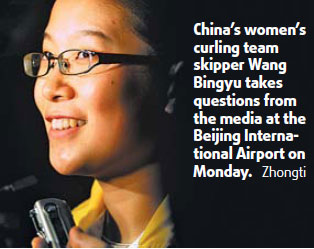Wang Bingyu stood unfazed last Sunday when she prepared for the decisive slide at the World Championships in Gangneung, South Korea, a cool move that bagged China's first curling world title.

It was an enthusiastic crowd at the Beijing Capital International Airport welcoming home their winning players on Monday that overwhelmed the skipper of China's national women's curling team instead.
"I'm more nervous right now than when I was competing," Wang said, as she spotted the swarm of reporters waiting anxiously for the curlers at the exit of the airport.
"It is the first time we are facing such a huge welcome."
Almost 100 people, including family and friends of the curlers as well as the media, flooded the airport to greet the record-blazing squad, which defeated world and Olympic champions Sweden to win the landmark crown.
The crowd grew larger as curious onlookers joined in.
Few people apparently recognized the national curlers even though their plays had been broadcast live nationwide in the past week.
The obscurity of the players up till then amplified the curlers' rise to the top with just six years of professional training in the sport.
"The victory of the team this time will draw more attention from the public for the sport, but it still has a long way to go for the sport to be really popular in China," said Li Dongyan, the leader of the team and head official of the sport in China.
Li was also one of the few who remained calm amid the excitement at the airport.
One of the earliest curlers in the country, Li got involved in the sport straight after the Scottish stone-sliding game was brought to China in 1995, where he witnessed the swift growth of the game in the past decade.
Set up in 2003, the national team finished second in their World Championship debut two years later and moved up to 5th in the 12-team the following year.
At the 2007 Pacific Curling Championships, the team took home gold medals and qualified for the 2008 World Championships, where they claimed the silver.
At the Winter Universiade last month in Harbin, the capital of Heilongjiang province, the Chinese women's team won its first gold medal in international multi-sports games after defeating traditional powerhouses Canada 6-5.
Despite the glowing achievements, the squad remains relatively unknown in China, with merely three curling arenas and fewer than 200 professional players, both men and women.
For the curlers, tough training conditions forced them to go overseas for better training facilities and atmosphere.
"When the team was just established, we had to train on ice hockey rinks and we had to draw all the lines for the game ourselves," Wang recalled.
"We had to train in the early morning to avoid clashing with the hockey teams."
The curlers' incomes were also low compared with the big-earning soccer and basketball players in China - less than 2,000 yuan ($292) a month.
But the team's lot changed after it started training in Canada in 2004. The curlers hired a Canadian coach in 2007, a move that saw immediate improvement.
"We saw curling rinks everywhere there and almost all were full of curlers," Wang said.
A stellar team began to emerge.
The curlers defeated Canada twice en route to their runner-up finish at last year's World Championships and only narrowly lost to the same rival in the final.
They suffered another loss to Canada in the opening game in the South Korean event, but went on to achieve 12 straight wins to claim the world title, including the final where the young squad defeated the two-time world and 2006 Olympic champions Sweden 8-6. It marked the first time an Asian country, in women's or men's play, has won the world championship of curling.
The live broadcast of the world championships final on the weekend also attracted many sport fans. The four players have become heroines of the online community, especially the 24-year-old Wang, whose last shot secured China's victory in the final.
"If I decide to marry, Wang would be an ideal wife," a online user wrote in one post.
Wang managed to cause a stir of her own at the airport.
"I saw their victory on TV yesterday and I'm very glad to see them face to face today," said Sun Ying, one of the onlookers who was at the airport to pick up her sister.
"I hope more and more people will be interested in curling and join the sport following this victory," said Zhao Yinggang, director of China's Winter Sports Administrative Center.
"Mass participation is the basis for any such development. Otherwise, the sport will remain unattractive."
"The team will be awarded their prize money shortly," Zhao said, without releasing any specific figures.
The victory is also said to have positioned China as a hot contender for the winter Olympic gold medal next year, even though officials had their feet firmly on the ground.
(China Daily April 1, 2009)